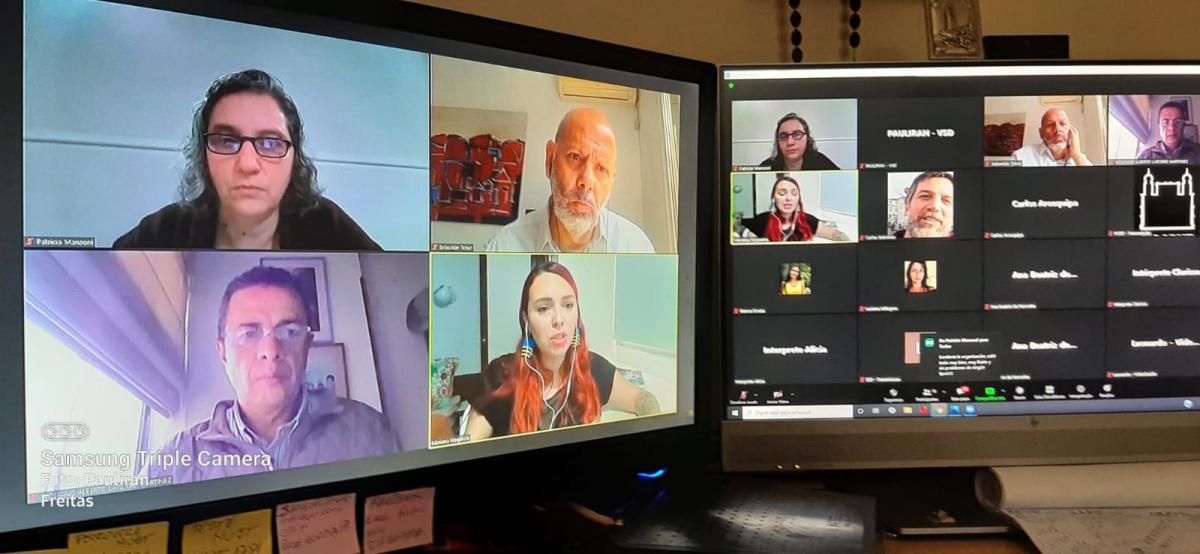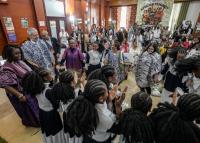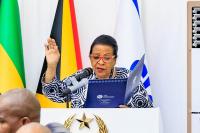Work and teacher training was the theme of the second workshop of the cycle 'The challenges of health technicians education during the pandemic
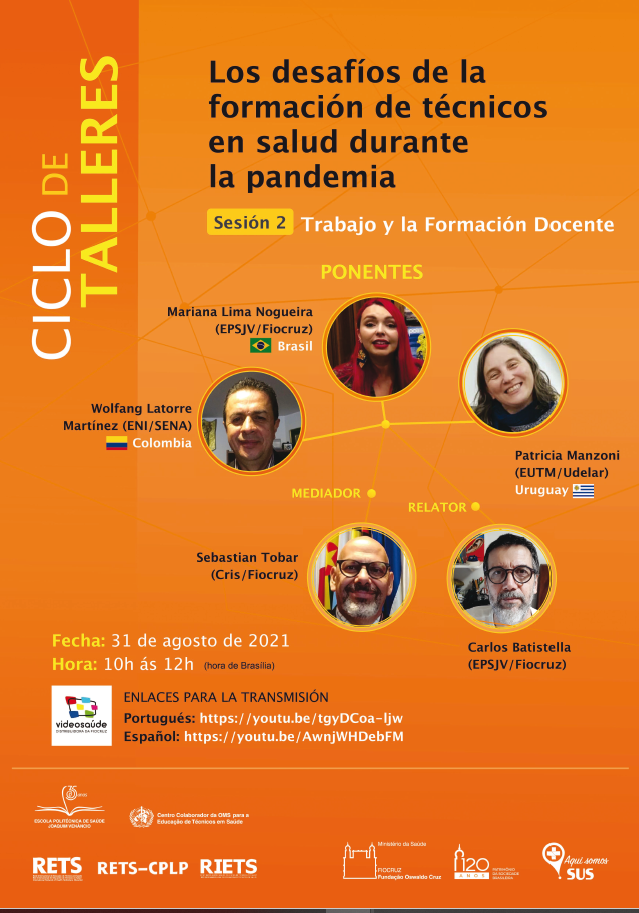 As part of the work plan as a World Health Organization (WHO) Collaborating Center for the Education of Health Technicians, the Joaquim Venâncio Polytechnic School of Health (EPSJV/Fiocruz) held, on August 31, the second workshop of the cycle "The challenges of health technicians education during the pandemic", with the theme "work and teacher training". The initiative is held in cooperation with the International Network of Health Technicians Education (RETS), the Ibero-American Network of Health Technicians Education (RIETS), and the Technical Health Schools Network of the Community of Portuguese-speaking Countries (RETS-CPLP). The event is also supported by the Center for International Relations in Health (Cris/Fiocruz) and VideoSaúde Distribuidora of Fiocruz.
As part of the work plan as a World Health Organization (WHO) Collaborating Center for the Education of Health Technicians, the Joaquim Venâncio Polytechnic School of Health (EPSJV/Fiocruz) held, on August 31, the second workshop of the cycle "The challenges of health technicians education during the pandemic", with the theme "work and teacher training". The initiative is held in cooperation with the International Network of Health Technicians Education (RETS), the Ibero-American Network of Health Technicians Education (RIETS), and the Technical Health Schools Network of the Community of Portuguese-speaking Countries (RETS-CPLP). The event is also supported by the Center for International Relations in Health (Cris/Fiocruz) and VideoSaúde Distribuidora of Fiocruz.
The purpose of the initiative is to generate a space for exchange, reflection, learning, and formulation of proposals based on the concrete experiences of institutions that are members of the networks in facing these challenges. Participating as debaters were: Wolfang Alberto Latorre Martínez, from the National School of Instructors 'Rodolfo Martínez Tono', of the Servicio Nacional de Aprendizaje (ENI/SENA - Colombia); Mariana Lima Nogueira, from EPSJV/Fiocruz; and Patricia Manzoni, director of the Universitary School of Medical Technology of the University of the Republic of Uruguay (EUTM/Udelar- Uruguay). The debate was mediated by Sebastián Tobar, Cris/Fiocruz researcher
In the view of the coordinator of International Cooperation of EPSJV, Carlos Batistella, challenged in their ways of acting, teachers needed to reformulate their practices, starting to interact with students through e-mail, messaging applications, teleconference platforms and virtual learning environments. "Many teachers found themselves unprepared to deal with the new devices and the pedagogical issues raised by the pandemic context," he said. He added: "In times of pandemic, more than ever, the health of populations depends on strengthening national health systems and our networks. Let's go forward together."
For Carlos Arosquipa, consultant for the Sub-Regional Cooperation Program for South America of PAHO/WHO, RETS and its sub-networks are carrying out very important work that is even more relevant in this pandemic context. "The WHO has calculated that we will need, in the medium term, 451,000 more professionals to be able to vaccinate the entire world population against Covid-19. It is clear that nursing professionals will not be enough to complete this challenge, and we will use all the capacity of the health system to train technicians and professionals to help in this great work. Therefore, the work of the schools that train technicians will become even more relevant.
Experiences in Uruguay, Colombia and Brazil
Patricia Manzoni, who presented the EUTM/Udelar experience, showed the challenges that virtual teaching has brought to teacher training. According to her, the university is present in most of the country and, during the pandemic, made available to the government all the knowledge, scientists, and facilities. "We were even part of a scientific group that promoted recommendations in the areas of health and science to the government," she said.
Among the challenges, Patricia cited the need to redesign courses, especially in the health area, which has a large practical part, the creation of repositories of virtual classes, expansion of virtual classrooms, and also the optimization of teaching resources, in which the same teacher could teach classes in different units. "We had to massify the digital platforms and guide the teachers to reschedule the courses", she said.
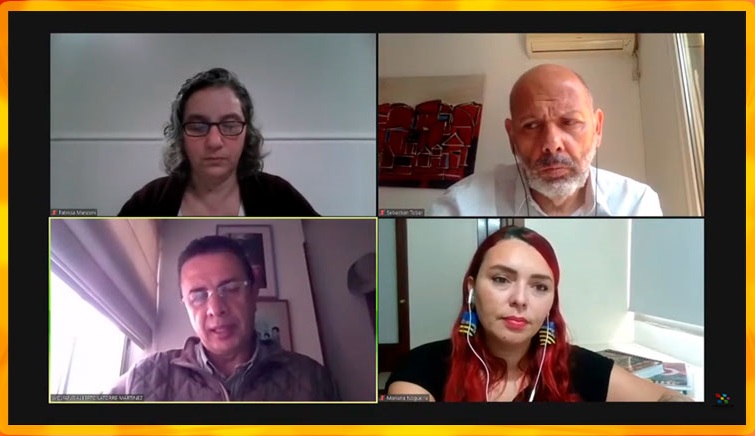
Currently, Patricia continued, the university continues working and reflecting on this new scenario. About learning, she pointed out the possibility of using virtual tools for the first years of courses that are basically theoretical. "And then move on to a hybrid modality in teaching. We are still thinking about how to adapt the standards and recommendations to the faculty, but without the slightest doubt, the face-to-face issue will be modified, because for a long time, presence will be limited," she concluded.
In Wolfang's view, training programs, especially in health care, were not designed for the virtual, but for the face-to-face. As a result, new forms of evaluation had to be thought of: "As there is less practice, adverse events in service delivery can increase. He added: "These new developments have affected the emotions of our students. We started to combine work, home and study. This created personal and emotional conflicts. We were not prepared for this new reality.
Wolfang also brought data about formal education in the country. In October 2020, according to him, of nine million enrolled, about 100,000 children stopped studying because of the pandemic, and more than five thousand missed the year in public schools and more than 500 in private schools. "While Sena, 35,000 of the more than 130,000 students were left without learning contracts because of the financial difficulties of the companies that sponsor them. It was an example of the devaluation of education."
To overcome the diversities, Wolfang said it was necessary to strengthen communication, articulate strategic collaboration with the productive sector, accompany and motivate adaptation with the limits of connectivity, foster empathy between instructors and learners, reduce tensions due to isolation and fear caused by Covid-19, and encourage interdisciplinary and collaborative work. "In addition, we hold workshops to familiarize and increase the digital skills of learners and instructors. We need to rethink working in the pandemic world, because the pandemic is not over and we may have others," she advocated.
Finally, Mariana said that, indeed, the pandemic imposes numerous challenges and difficult conditions to work and to follow with the dialogical teaching-learning process. "How to maintain thoughtful, dialogic communication and listening at a distance?" she questioned, pointing out that there are structural limits posed by the social and economic conditions of most health technicians in Brazil and by the health crisis. Given this context, the teacher-researcher reported the experience of the Technical Course in Community Health Agents (CTACS), which EPSJV has offered for over ten years.
"Our students are workers, women, mothers, grandmothers, black and brown, who support their families with less than two minimum wages per month. And it is necessary to recognize the determinations and oppressions of class, race, and gender that constitute the work experience of the community health agents in a peripheral, dependent capitalist country, marked by colonialism and three centuries of slavery," she pointed out.
With the suspension of classroom activities, Mariana said that the course was suspended from March to July 2020. During this time, several virtual meetings were held with teachers and students to discuss the need to adapt the curriculum and the conditions for these students to access online classes.
In July, EPSJV started offering remote classes and supplementary activities. In addition, the meetings between the professors took place with greater regularity due to the identification of needs for structure and sharing of didactic and research proposals and content elaboration. "We held meetings with working students to think about what their immediate needs were regarding their work in the health services and their lives as workers, students, and women. We organized a Whatsapp group for communication with the group of female students and gathered information about the technological infrastructure of the students; about the impacts of the pandemic on their emotional health and about the experience of remote teaching," she said.
Mariana also pointed out that a specific space was created on the EPSJV website, with materials directed to health work at the time of the pandemic. "We, teachers, had to redouble our efforts to reorganize the curriculum, teach classes, coordinate courses, meet the emotional demands of the students, and produce guides, texts, and research to support public policies for the care of the population in the SUS (brazilian health system)," she analyzed, citing the research "Health monitoring and contributions to the work and training of community health agents in times of Covid-19".
Understanding the reality of the students, Mariana reported a worsening of the students' mental health, since about 90% of the class experienced the loss of acquaintances, relatives, or co-workers by Covid-19. "In light of this, as coordination, we produced a survey of psychosocial support networks in SUS for the female learners and maintain ongoing listening. As teachers, we produce video and audio content on topics relevant to the practice of community health agents and to the mental health of workers, such as courses on self-care and herbal medicine," she said.
Regarding connectivity, 62% of the students accessed the Internet exclusively through their cell phones. "EPSJV, together with Fiocruz, offered tablets to the students and teachers. Without this, the continuation of the course would not be possible, she said. "We cannot naturalize remote teaching in health. We have to understand it as a necessary arrangement in this pandemic period while there is no universalization of vaccines and pandemic containment," she concluded.
About the Cycle of workshops
Faced with the suspension of classroom activities due to the Covid-19 pandemic, training institutions began to live the dilemma of reinventing their daily school life in a short period of time and under completely adverse conditions to continue to carry out their mission with the students.
With this in mind, EPSJV/Fiocruz launched the workshop cycle 'The challenges of health technicians education during the pandemic', whose first edition was held on July 6th and addressed the issue of 'professionalizing practices' that cannot be performed virtually.
The workshops are being held every 45 or 60 days, in Portuguese and Spanish, with a duration of two hours. The proposal is to present, in each workshop, the experiences made by members of the networks, in order to allow the disclosure, reflection and debate prioritizing the exchange among those present.
Based on the issues discussed, topics of interest for the next workshops will be defined. The proposal is that, as a product of the workshop cycle, a document summarizing the main issues presented will be prepared and disseminated. This document, which can be complemented with the videos that will be available on the internet, can become a tool to be used as a basis for your training strategies.
Event videos:
-
In portuguese: https://www.youtube.com/watch?v=tgyDCoa-ljw
-
In spanish: https://youtu.be/AwnjWHDebFM
Presentations:
